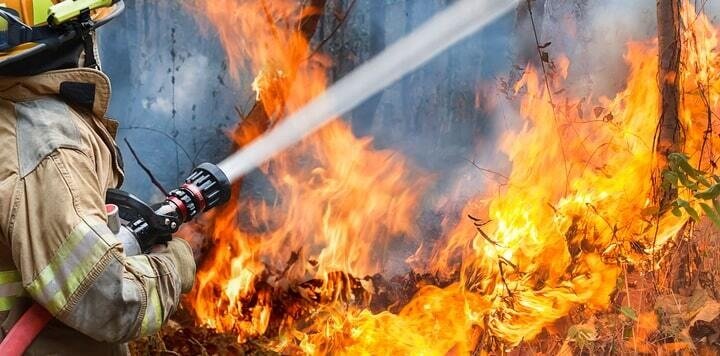Brooke graduated from the University of Richmond School of Law after receiving her undergraduate degree from the University of North Carolina at Chapel Hill. Brooke worked for five years in private practice with a law firm specializing in insurance defense litigation before becoming the trial litigator for Allstate Insurance Company in the metro Richmond area.
Firefighting is a profession of immense bravery and sacrifice, but it also carries significant risks, not just in terms of immediate physical danger but also in long-term health impacts. The hazardous environments and physically demanding tasks that firefighters face daily make them particularly vulnerable to developing certain occupational diseases.
If you’re a firefighter who has been diagnosed with cardiovascular disease, respiratory illness, or hypertension, understanding your legal rights under Virginia law is essential. Two key statutes, Virginia Code Section 65.2-402 and Virginia Code Section 65.2-400, provide important protections for those dealing with firefighter occupational diseases.
Understanding Firefighter Occupational Diseases
Firefighters routinely experience exposure to a range of harmful substances, including toxic chemicals, smoke, and other hazardous materials.
Over time, this exposure can lead to the development of severe health conditions. These conditions, often referred to as firefighter occupational diseases, are recognized under Virginia law, which provides specific legal protections for affected firefighters.
Among the most common occupational diseases for firefighters are cancers, cardiovascular disease, respiratory illnesses, and hypertension. These conditions are not just incidental to the job—they are often a direct result of the unique and dangerous environment in which firefighters work.
The Heart and Lung Act: A Critical Protection for Firefighters
The Heart and Lung Act, Virginia Code Section 65.2-402, is one of Virginia’s most important legal protections for firefighters.
This statute establishes a legal presumption that certain diseases, including heart disease, hypertension, and certain respiratory diseases, are related to a firefighter’s work. If you develop any of these conditions after serving as a firefighter, the law presumes that your job caused or contributed to the disease.
This presumption is significant because it shifts the burden of proof away from you, the employee, and onto your employer or their insurance company. Instead of having to prove that your disease was caused by your job, the burden is on your employer to provide substantial evidence to the contrary.
The Heart and Lung Act is particularly important because it recognizes the cumulative effects of firefighting on the body. Cardiovascular and respiratory systems can be severely impacted by the constant physical strain and exposure to harmful substances, even if the symptoms don’t appear immediately. By establishing this presumption, the law acknowledges the unique risks firefighters face and provides a legal framework for them to receive compensation and benefits.
Virginia Code Section 65.2-400: Broadening the Scope of Occupational Diseases
While Virginia Code Section 65.2-402 specifically addresses heart and lung conditions, Virginia Code Section 65.2-400 takes a broader approach to occupational diseases. This statute defines an occupational disease as a condition arising out of and in the course of employment, particularly diseases that are peculiar to a particular trade or occupation.
For firefighters, this occupational disease list could include a range of conditions beyond heart and lung issues, such as certain types of cancer, musculoskeletal disorders, or other illnesses that can be linked directly to the job.
Under Virginia Code Section 65.2-400, if you develop a disease connected to your job as a firefighter, you may have grounds to file an occupational disease claim. The statute emphasizes that the disease must be a natural consequence of your work environment, including repeated exposure to toxins, smoke inhalation, and other occupational hazards.
This statute ensures that even if your condition is not explicitly listed under Virginia Code Section 65.2-402, you can still seek compensation if you demonstrate that your disease is related to your work.
Filing an Occupational Disease Claim: What You Need to Know
If you’ve been diagnosed with a disease that you believe is related to your work as a firefighter, it’s crucial to understand the process of filing an occupational disease claim. The process involves several key steps, and being informed can help you navigate it more effectively:
Medical Diagnosis
The first step in filing a claim is to obtain a clear medical diagnosis from a qualified healthcare professional. The diagnosis should include an assessment linking your disease to your work as a firefighter.
For example, if you have developed cardiovascular disease, your doctor should be able to explain how the physical demands of firefighting, combined with exposure to smoke and other toxins, contributed to your condition.
Timely Filing
Virginia law generally requires that you file your claim within two years of the date of diagnosis. It’s essential to act quickly, as missing this deadline could result in losing your right to seek compensation.
Proving Your Claim
While Virginia Code Section 65.2-402 provides a presumption in favor of firefighters for certain diseases, claims under Virginia Code Section 65.2-400 may require you to present more evidence. You may need medical records, expert testimony, and documentation of your work history to demonstrate that your disease is indeed work-related.
Legal Representation
Given the complexities of these claims and the potential resistance from employers or insurance companies, consulting with an experienced occupational disease lawyer is highly recommended.
A lawyer who understands the intricacies of firefighter occupational diseases and Virginia’s legal framework can help you build a strong case and navigate the legal process.
Why You Should Consult an Occupational Disease Lawyer
Filing a claim for an occupational illness can be a complex and emotionally challenging process, especially when dealing with serious health issues.
An experienced occupational disease lawyer can provide valuable guidance and support, helping you understand your rights under Virginia Code Section 65.2-402 and Virginia Code Section 65.2-400.
They can also help you gather the necessary evidence, meet deadlines, and negotiate with employers or insurance companies to ensure you receive the compensation and benefits you deserve.
At River Run Law, we are dedicated to advocating for the rights of firefighters and other professionals who face health challenges due to their work. We understand the unique risks and sacrifices associated with firefighting and are committed to helping you secure your future.
Whether you’re dealing with cardiovascular disease, respiratory illness, or any other firefighter occupational disease or condition, we are here to support you.
Where to find our Richmond office:



